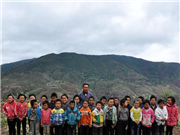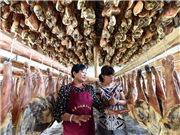

1. Fiscal policy for 2015
We will continue to implement proactive fiscal policy in 2015 and, as appropriate, increase the intensity. This will be mainly reflected in the following four areas:
First, we will increase the deficit by an appropriate amount and put to use funds carried over from previous years to increase the intensity of spending. Government deficit for 2015 is projected to be 1.62 trillion yuan nationwide, an increase of 270 billion yuan over last year, with increases in both the central government deficit and the local government deficit. This means that the deficit to GDP ratio will come to approximately 2.3%, up 0.2 percentage points on last year. In addition, the special debt of local governments that has been placed under the management of government-managed funds budgets will be increased by 100 billion yuan; and the central government will use 112.4 billion yuan of funds carried over from previous years to further increase the intensity of spending.
Second, we will implement structural tax cuts as well as reductions to fees across the board to strengthen our support for the real economy. As we push forward with the reform of the tax system, we will review and standardize tax relief and other preferential policies, and channel great energy into completing our work to replace business tax with VAT in all industries, thus further eliminating duplicate tax charges. We will make sure measures to reduce fees across the board are fully implemented, reduce or waive payments into government-managed funds as well as administrative charges for small and micro businesses, and continue to do away with unauthorized charges in order to relieve the burden on these enterprises.
Third, we will strengthen efforts to make use of available government funds, and use funds more effectively. We will act in line with the requirements of the new Budget Law to develop an accurate picture of carryover and surplus funds, and in putting these funds to use we will favor areas such as public services, infrastructure, and improving quality of life. We will review special fiscal accounts, set ceilings for working capital in the budgets and budget stabilization funds, and carry out fiscal planning on a rolling basis for the next three years to prevent new funds from becoming idle.
Fourth, we will keep government investments at a certain scale, and make good use of the guiding role of such investments. This year the central government will earmark 477.6 billion yuan for investment in infrastructure, which is 20 billion yuan more than the previous year. The orientation of government investment will be adjusted and improved, with funds being used primarily for major state projects, trans-regional and cross-watershed investment projects, and major projects with strong externalities. We will further reduce investment in competitive areas and on subsidizing small and miscellaneous local projects.
Major spending policies are as follows:
Education
We will carry out the second phase of the action plan for preschool education. Our focus will continue to be on poor areas and schools that are badly built and poorly operated, and support and guidance will be given to local governments to encourage them to increase input into efforts to develop primary and secondary boarding schools in poor rural areas, expand and renovate schools in counties and townships to help them cope with increasing class sizes as more and more students from villages attend these schools, and improve facilities for primary and secondary school students, all with the aim of improving the basic conditions of badly built and poorly operated schools for compulsory education. We will implement the system of government financial aid policies. We will raise the annual government grants for students in secondary vocational schools and regular senior high schools from 1,500 yuan to 2,000 yuan per student. We will continue to implement the quality improvement plan for modern vocational education, and guide and incentivize local governments to step up the pace of work to improve their systems for allocating funds to vocational colleges based on student numbers. In this regard, awards and subsidies will be given to local governments from the central budget based on an evaluation of their respective progress in developing such a system, contribution of financial resources, reform and development in vocational education, and other factors. We will reform and improve the funding mechanisms for institutions of higher learning under the central government so that the cost of education can be shared between the government and students in a reasonable way; and we will encourage these institutions to embrace an internal quality building model of development and cultivate innovative students. We will support the development of local universities and colleges, pushing them to improve quality and helping them bring out their own distinct features. Impetus will be given to international exchange and cooperation in education.
Science and technology
We will put into practice the strategy of innovation-driven development. We will deepen reform in the management of science and technology initiatives (projects and funds) financed by the central government, taking proactive steps to optimize and integrate all types of science and technology initiatives, establishing an open and unified national science and technology management platform, and developing comprehensive, integrated methods for planning and implementing initiatives. We will improve and strengthen the management of research programs and their funding. We will expand the scale of the national seed fund for the application of scientific and technological advances and attract more nongovernmental funds and financial capital to support application. We will establish a national seed fund for investment in business start-ups in emerging industries, offering financial support primarily to innovative enterprises in emerging industries which are still in the embryonic stage, thus generating impetus for new businesses, innovation, and the upgrading of industry by pooling government, nongovernment, and private funds. We will promote the open sharing of scientific and technological resources by establishing a mechanism of subsidizing operators of major national facilities for scientific research and large or costly research apparatus who allow public access to their facilities. We will improve the funding mechanism for research institutes at the central level. We will increase spending on basic research and support efforts that raise our ability to make original innovations. We will give financial support to speed up progress in major national science and technology initiatives. We will improve government procurement policies and measures that support innovation and increase procurement of innovative products. Trials will be launched to test a compensation mechanism for insuring major newly developed technological equipment.
 |  |
Day|Week

 Tsinghua junior makes over 10,000 yuan a day by selling alumnae's used quilts
Tsinghua junior makes over 10,000 yuan a day by selling alumnae's used quilts Graduation photos of students from Zhongnan University
Graduation photos of students from Zhongnan University A school with only one teacher in deep mountains
A school with only one teacher in deep mountains Glimpse of cultural heritage "Xilankapu"
Glimpse of cultural heritage "Xilankapu" Homemade cured hams in SW China
Homemade cured hams in SW China Breathtaking buildings of W. Sichuan Plateau
Breathtaking buildings of W. Sichuan Plateau Graduation photos of "legal beauties"
Graduation photos of "legal beauties" Top 10 most expensive restaurants in Beijing in 2015
Top 10 most expensive restaurants in Beijing in 2015